Every month, we pick a few topics for exploration. The topics we select aren’t meant to cover every part of every issue area, but rather provide a unique insight into what Americans say and believe about issues that matter. This month we focused on:
President Trump’s approach to foreign policy is deeply unpopular. How can progressives make their case?
Progressives should speak to concerns about the direction of Trump’s foreign policy strategy and emphasize his recklessness, harm to the perilous state of American alliances under Trump, and the consequences of his decision-making in Syria on American interests globally.
Two years after passage, what do Americans need to know about the tax law?
Public opinion remains divided and slightly negative about the tax law passed in late 2017. Americans are not firm in their views, however: when told more about the breaks granted to the wealthiest Americans and the risks created for Medicare and Social Security, opinions turn decisively negative.
Americans oppose the Trump administration’s proposed changes to SNAP. What worries them the most?
Americans oppose cutting back on the Supplemental Nutrition Assistance Program (SNAP), particularly when they hear about how many low-income children could be impacted by the changes.
Donald Trump’s weakness on foreign policy offers a clear opening for progressives.
Americans are concerned about Trump’s handling of foreign policy and the image of American diplomacy around the world. President Trump’s sudden, unexpected decision to withdraw U.S. military personnel from Syria led to resounding criticism, even from Republican elected officials. Two- thirds of House Republicans voted with Democrats in October to condemn the President’s decision as harmful to our allies and helpful to our enemies.
The latest Navigator Research poll finds Americans agreeing with lawmakers: foreign policy is a clear weak point for Trump, even with his base. Overall, just 39% approve of his handling of foreign policy, while 56% disapprove. Moreover, a majority (70%) of Americans are “somewhat” or “very concerned” about “the way American foreign policy” and “America’s role in the world” are changing under Trump. Democrats and independents are overwhelmingly concerned (94% and 73%, respectively), but even 42% of Republicans are concerned, far more than the 16% of Republicans who disapprove of Trump’s overall job performance. Likewise, a majority (64%) of whites without a college degree – a group typically supportive of the president – are concerned about the direction of foreign policy under Trump, along with 70% of college- educated white Americans. This provides a valuable opportunity for progressives to offer an alternative vision for U.S. foreign policy.
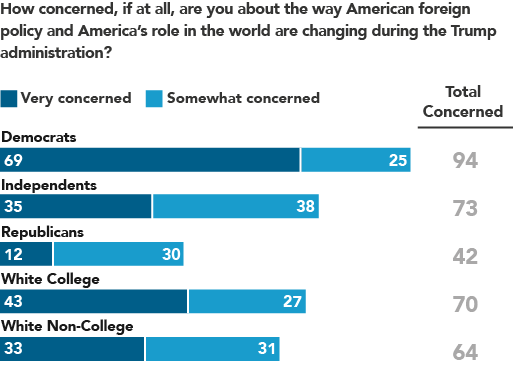
Democrats in Congress have credibility on several
important issues related to foreign policy.
The days when Democrats had a disadvantage on foreign policy are in the past. Overall, 49% of Americans say they trust Democrats in Congress more on “foreign policy,” versus 37% who say they trust Trump more. A majority (51%) also trust Democrats in Congress more than Trump to maintain “strong alliances with countries around the world” versus 35% who trust Trump more. And, despite Trump’s “America First” rhetoric, 46% of Americans trust Democrats in Congress more to keep Americans “safe and secure” versus 40% who trust Trump more.
Progressives can position themselves as a thoughtful party ready to strengthen our alliances – and take advantage of Republican weaknesses for putting partisan interests ahead of national interests.
In a separate series of questions, respondents rate a list of important values in foreign policy as applying better to Democrats or President Trump and the Republicans.
- By clear margins, Democrats are more likely to be seen as “a good partner to American allies” and “thoughtful.”
- Similarly, Trump and Republicans are less likely to be seen as putting national interests ahead of partisan interests. Progressives can highlight Trump’s actions relating to Ukraine as a moment where he put himself first, and where Republicans have prioritized politics.
- Meanwhile Democrats have more work to do in demonstrating they are the party with a “clear foreign policy strategy.”
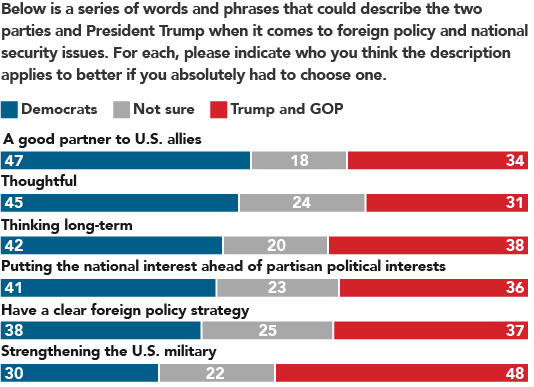
Make the case that Trump’s impulsiveness threatens our national security and weakens our alliances.
Progressives can bolster their advantage on foreign policy by emphasizing Trump’s recklessness and the damage it is causing. On their greatest concern about Trump’s foreign policy approach, public opinion is clear: he is reckless and impulsive. Forty percent (40%) select recklessness from a list of potential criticisms, including 49% of Democrats, 44% of independents, and 27% of Republicans. The next highest ranking item is far below at 22% – Trump “lacks understanding” of foreign affairs. Twenty-one percent (21%) worry most he “doesn’t seek advice from his advisors” on foreign policy.
Syria specifically highlights Trump’s recklessness. Syria is important: while 70% are concerned about Donald Trump’s foreign policy in general, 80% are concerned about the Syria withdrawal once they read a paragraph describing the circumstances and consequences of the withdrawal. Focusing in particular on the potential resurgence of ISIS and the empowerment of other U.S. rivals – Iran and Russia – can speak to concerns a majority of Americans share. But here, too, Trump’s recklessness rises to the top. Americans are also troubled by the idea that our allies will no longer be able to trust us, and that Trump’s actions opened the door to the ethnic cleansing of the Kurds.
An opening for ISIS, borne out of recklessness.
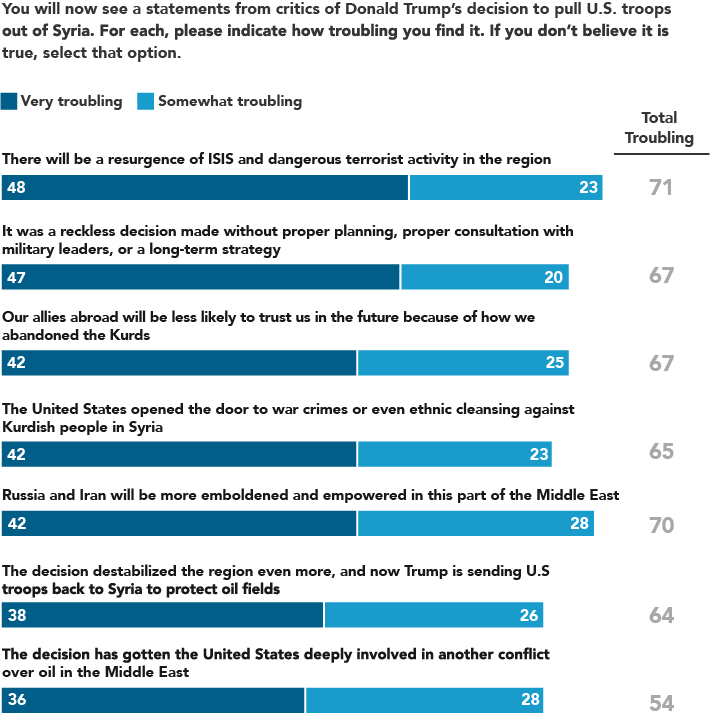
The tax law remains unpopular overall, with few believing it has had a positive impact on either them or the economy.
As the Tax Cuts and Jobs Act (TCJA) approaches its two-year anniversary since passage and being signed into law, Navigator sought to revisit public opinion concerning the legislation many believe to be President Trump’s biggest legislative accomplishment. Overall, opposition continues to narrowly outpace support (34% support – 39% oppose) as it has in previous Navigator surveys, while a sizable segment of the public continues to express feelings of uncertainty. Closer examination across key demographics reveals several key takeaways:
Gender: There is a sizable 15-point gender gap in support for the law (42% among men versus just 27% among women); yet, levels of opposition are roughly the same between the genders (40% among men versus 38% among women). Women are less likely to have a firm opinion one way or the other (35% are not sure compared to 18% of men). The difference is primarily concentrated among Republicans: at 59% support, Republican women are far less likely than Republican men (80%) to support the bill.
Income: Opposition to the law is higher among lower-income households, while support for the law is higher in higher-income households. Among those making less than $100,000 a year, net opposition to the law is 8 points (32% support – 40% oppose) while net support for the law is 9 points (45% support – 36% oppose) among households making more than $100,000 a year.
Partisan affiliation: Self-identified Republicans are about as supportive of the law (69% support) as self-identified Democrats are opposed to it (66% oppose). However, among independents, just 19% register support for the law while 38% are opposed (another 43% are not sure).
Few Americans support the 2017 Republican tax law or believe they have personally benefited from its passage.
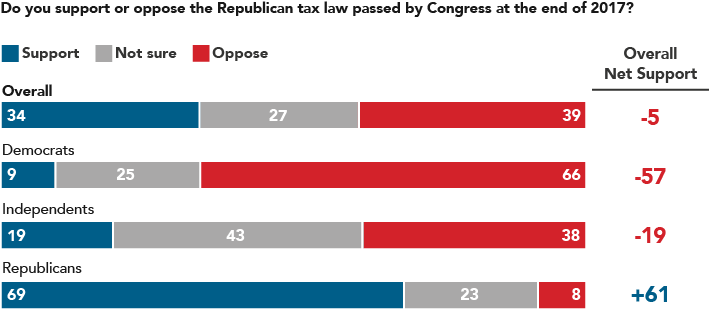
Moreover, most Americans remain unconvinced that the tax law has led to improvements in either the overall economy or their personal finances. Only a third believe the law has led to improvements in the nation’s overall economy and job market (33%), and fewer Americans (18%) say the tax law has benefited them personally, as a plurality (41%) say that it has had no impact on their personal finances at all.

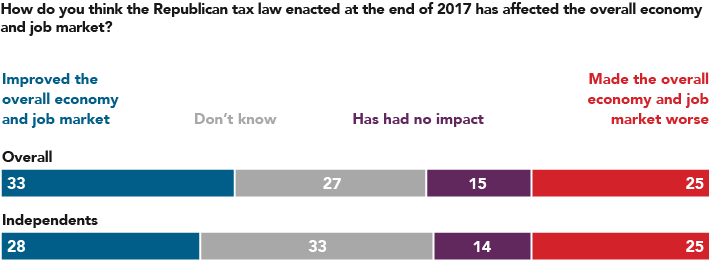
Progressives should lean into arguments about tax fairness and proposed cuts to social safety net programs coming as a result of the tax law.
Navigator finds that four statements, each outlining a different outcome of the tax law, generate at least some level of concern from a majority of the American public.
Two arguments are clearly most effective of the four, however:
- One statement highlights proposed spending cuts to Medicare, Medicaid, and Social Security to offset deficit increases caused by the tax law.
- Another statement calls attention to the fact that last year the wealthiest 400 families paid a lower effective tax rate than the bottom half of American households.
Alternative arguments – focused on the growth of corporate profits at the expense of median wages and the growth of stock buybacks – elicit similar levels of overall concern, but fewer Americans find these statements “very” concerning.
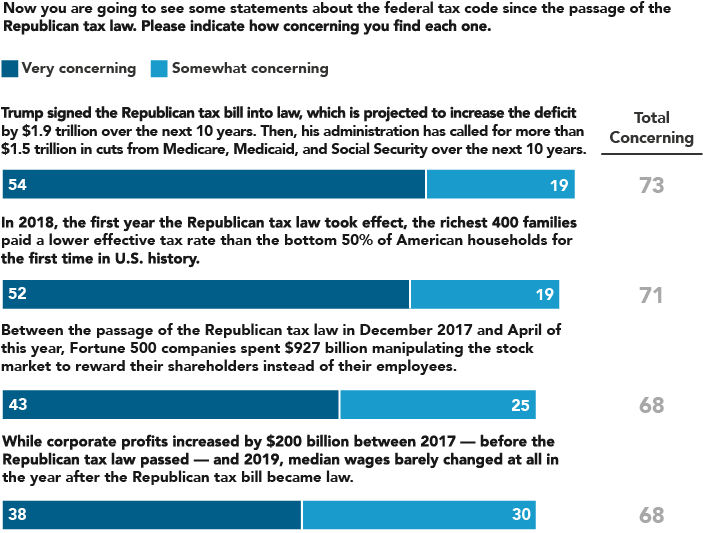
A Navigator experiment validates how opinion could shift as progressives emphasize these consequences. Respondents were re-asked about the tax law after hearing just two of the four messages each, and opinions moved substantially against the bill, from 34% support – 39% oppose (-5) to 31% – 53% (-22).
Notable shifts occur among Independents (net 23-point increase in opposition to the law), women (net 21-point increase in opposition to the law), and even Americans with an annual income of $100,000 or more (net 22-point increase in opposition to the law).
Americans overwhelmingly oppose the Trump administration’s proposed changes to the Supplemental Nutrition Assistance Program (SNAP).
Early in October 2019, the Trump administration unveiled even more cuts to SNAP, often referred to as the food stamp program. In order to understand Americans’ views about a less-frequently discussed issue, Navigator Research presented respondents with a brief summary of arguments for and against the changes before asking for opinions. Respondents learned that supporters of the changes argue they will close loopholes and reduce taxpayer spending. Respondents also learned what opponents say: the changes would threaten access to free school breakfast and lunch for nearly one million kids. After hearing both sides, however, the public sides clearly against the proposed changes (57% to 33%).
Opposition prevails across most demographics, although some – namely white men – are more divided.
Notably, net opposition among white non-college graduates (-17), a group that tends to be favorable to President Trump, exceeds that of white college graduates (-10).
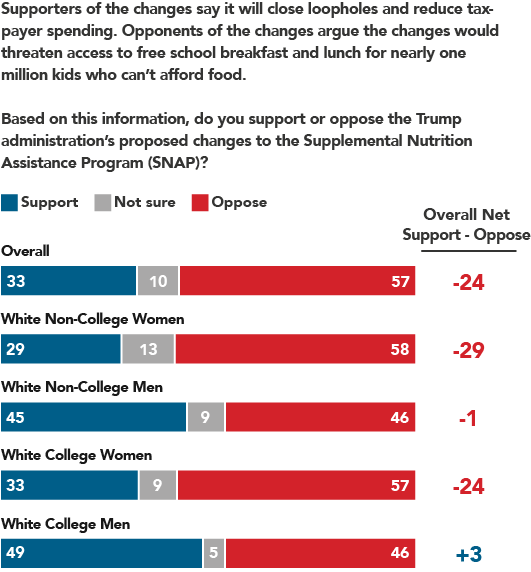
Those advocating against the changes should focus on the direct impact on kids across the country: potentially losing eligibility to receive free school meals, which are often the only square meals these kids get each day.
Public concern is highest when respondents are told a million low income kids will lose eligibility to free breakfast and lunch at school. Fifty-eight percent (58%) of Americans find this “very concerning.” Two other statements elicit strong concern from around half of the public – one explaining the Trump administration may be underestimating the negative impact of the changes and another emphasizing the administration has the wrong priorities, while highlighting recent tax breaks granted to the wealthiest Americans.
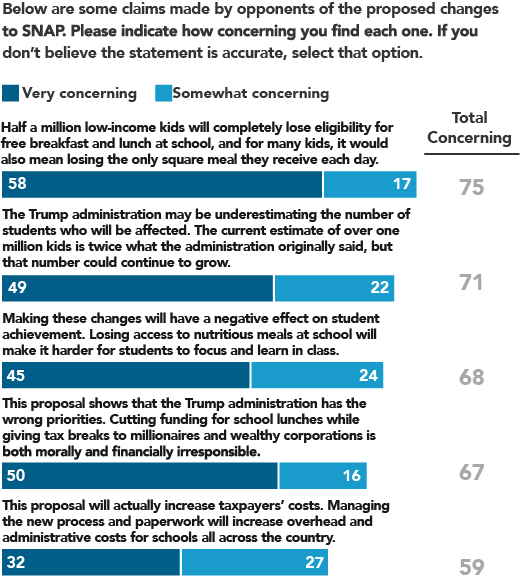
About The Study
Global Strategy Group conducted a public opinion survey among a sample of 1,500 registered voters conducted November 1-5, 2019. The survey was conducted online, recruiting respondents from multiple opt-in online panel vendors. Respondents were verified against a voter file and special care was taken to ensure the demographic composition of our sample matched that of the national registered voter population across a variety of demographic variables.
